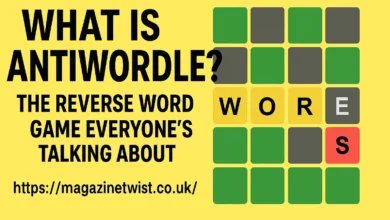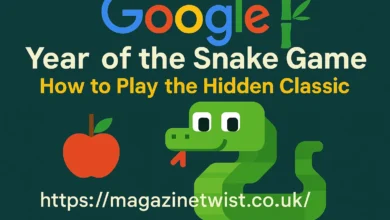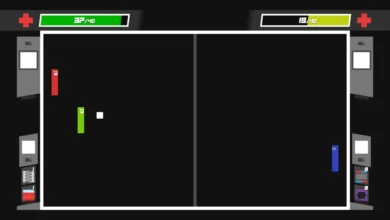Anti Wordle: The Reverse Puzzle That’s Turning Word Games Upside Down
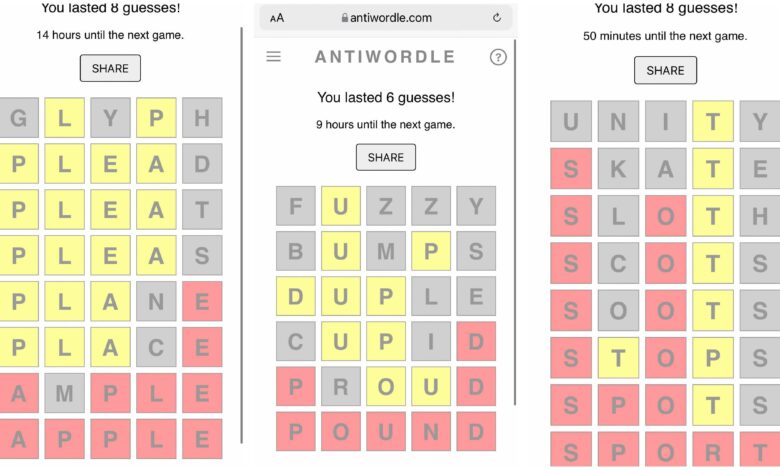
Anti Wordle been sucked into the daily ritual of guessing five-letter words in a few tries, chances are you’ve met Wordle. But what if we told you there’s a game that flips everything you know about Wordle on its head? Welcome to the fascinating world of anti-Wordle. This isn’t just a quirky spin-off—it’s a brilliant twist that makes you rethink everything you know about word puzzles.
Anti Wordle is exactly what it sounds like: the opposite of Wordle. Where Wordle challenges you to guess a word as fast as possible, anti-Wordle dares you to avoid the correct answer for as long as you can. It’s frustrating, addictive, and oddly satisfying. Let’s dive into the curious charm of anti-Wordle, see why it’s taking the word game scene by storm, and explore how it rewrites the rules of play.
The Birth of Anti-Wordle: A Rebellion Against Simplicity
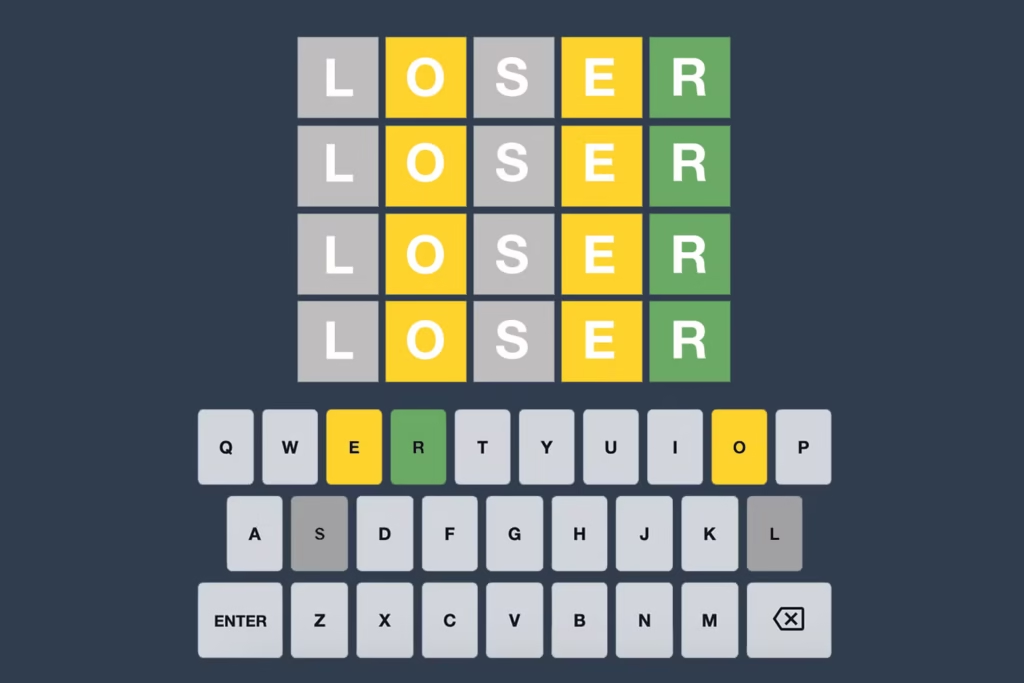
As much as people love the clean, satisfying challenge of Wordle, not everyone is content following the same path every day. That’s where anti-Wordle comes in. This game wasn’t just made for fun—it was made as a rebellion, a quirky reaction to the simplicity and structure of traditional word puzzles.
Unlike Wordle, where the objective is crystal clear and the rules are straightforward, anti-Wordle thrives in confusion and contradiction. The player isn’t rewarded for guessing the word correctly. That’s exactly what you want to avoid. The longer it takes you to find the right answer, the better. It’s an anti-strategy strategy game, where conventional wisdom gets tossed out the window.
The story of anti Wordle is really a story of creativity in the digital age. Indie developers, fueled by the success of Wordle and its viral spread, saw an opportunity to subvert expectations. And from that opportunity came a game that’s equal parts clever and chaotic.
How Anti-Wordle Works: Learning the Opposite Game
To understand anti-Wordle, you’ve got to unlearn what you think you know about word games. Most of us are trained to find patterns quickly and solve puzzles efficiently. Anti-Wordle makes you slow down and think backward. The rules feel familiar at first, but then the twist hits.
You still guess five-letter words. You still get color-coded feedback. But here’s the catch: once you correctly guess a letter in the right position, it gets locked. That means you can’t change it. Once you’ve used a letter, it’s gone. You can’t use it again. So your available word bank shrinks with every guess, and your chances of accidentally solving the puzzle increase.
It’s not about being clever with words. It’s about dancing around the correct answer, trying to delay the inevitable. You play to avoid success. And that’s what makes anti-Wordle so uniquely compelling.
The mental shift needed to enjoy anti Wordle is pretty huge. It’s no longer about solving. It’s about surviving. About tiptoeing around the landmines of correct letters and hoping your guess is just wrong enough to keep the game going.
Why Anti-Wordle Is So Addictive
There’s something almost masochistic about playing anti Wordle. It challenges the perfectionist in you and rewards failure most weirdly. Instead of the satisfaction of nailing a word in one try, you feel a strange joy when your guess is completely, hopelessly wrong.
That’s the paradox of anti Wordle. It flips the script and rewards the opposite of progress. But it works because it appeals to a different kind of brain—one that enjoys obstacles, detours, and unconventional paths. The frustration is part of the fun.
You also can’t ignore the daily dose of challenges. Just like its cousin Wordle, anti-Wordle resets every day. That means you only get one shot at beating your previous delay record. You have to make your guesses count, and that daily limit adds just the right amount of pressure.
Add social sharing to the mix, and you’ve got a perfect storm. People love showing off how long they have delayed success. Screenshots of games that last 10, 12, or even more guesses become digital trophies, proof of reverse mastery.
The Strategy Behind Losing: How to Win at Anti-Wordle
If you think anti-Wordle is just about typing in random words, think again. There’s the actual strategy here—just a twisted one. You’re not aiming for speed or accuracy. You’re aiming for controlled failure. And that takes a sharp mind.
First, avoid common letters early on. Words with unusual or rare letters give you the most wiggle room. Think about using letters like Q, X, Z, or J. They’re less likely to appear in the final word, and using them early can help you stretch your attempts.
Second, keep track of what’s been used. Because letters get removed after each guess, your pool of available words shrinks. If you’re not careful, you’ll box yourself into a corner and end up solving the puzzle by mistake. That’s the opposite of your goal in anti-Wordle.
Third, get creative with your word choices. Think about obscure words or unusual combinations. The goal is to avoid locking in too many correct letters too early. The longer you delay progress, the better your game.
Anti-Wordle vs Wordle: The Ultimate Showdown
Comparing anti Wordle and Wordle is like comparing chess to reverse chess—one’s about attack, the other about avoidance. While they share the basic format of five-letter guessing games, their core philosophies are polar opposites.
Wordle encourages deduction, logic, and pattern recognition. You start broad and narrow things down until you zero in on the answer. It’s neat, clean, and rewarding. Anti-Wordle throws that all out. You start with avoidance, use misdirection, and hope you never find the answer until you absolutely have to.
This creates a different kind of satisfaction. Wordle is about being right. Anti-Wordle is about not being wrong, yet. It’s a game for those who enjoy the tension of delay, the art of procrastination, and the beauty of stumbling without falling.
It also means the player base splits along different lines. Some people love the tidy success of Wordle. Others prefer the chaotic struggle of anti-Wordle. And then there are the true puzzle-heads who enjoy both, toggling between order and disorder.
The Psychology of Playing Anti-Wordle
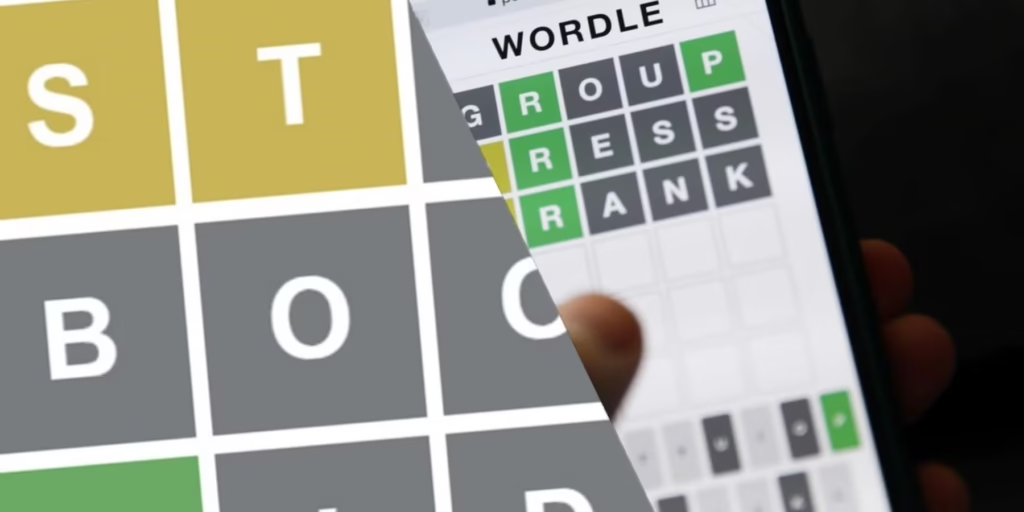
It might seem like just a game, but there’s real psychology at play in anti Wordle. The idea of “winning by losing” taps into a deep-seated part of our minds that enjoys contradiction. It’s why people love plot twists or ironic humor—our brains like surprises.
In anti-Wordle, your mind has to adapt quickly. The satisfaction of avoiding success becomes its reward. That flips the usual dopamine response on its head. Instead of feeling good for getting closer to the goal, you feel good for staying away.
There’s also a sense of control. While Wordle gently guides you to a solution, anti-Wordle gives you the freedom to mess up strategically. You feel like you’re navigating a minefield, and each safe step feels like a tiny victory.
And let’s not ignore the challenge aspect. Anti Wordle can be harder than it looks. Playing it well requires planning, flexibility, and the ability to think backward. It pushes your brain to operate in reverse, and that makes it uniquely satisfying.
Community and Culture: The Anti-Wordle Buzz
One of the most fun aspects of anti Wordle is how quickly it’s built a community. Just like Wordle had its green-and-yellow boxes shared on social media, anti Wordle has its own visual culture. People post their failure-streaks proudly, showing how long they avoided the correct answer.
Something is charming about a community built around controlled chaos. Fans of anti Wordle love to discuss tactics, joke about how close they came to “accidentally” winning, and celebrate the beauty of near-misses. It’s a culture of mischief, and it thrives online.
You’ll find Reddit threads dedicated to daily anti-Wordle strategies, Twitter accounts posting the longest games, and even Discord servers where players swap notes on what words are best to avoid success. It’s a weird but wonderful corner of the internet.
Variations and Spin-Offs: Anti-Wordle’s Expanding Universe
When something goes viral in the puzzle world, it doesn’t take long before variations start popping up. Anti Wordle is no different. From themed anti-Wordle challenges to spin-offs involving longer words or added rules, the game’s universe is expanding.
Some variations introduce time limits. Others tweak the rules to include six-letter words or allow reusing eliminated letters. There are even mashups that blend elements of anti-Wordle with other games, like Hangman or crossword formats.
This kind of experimentation keeps the game fresh. Just when you think you’ve mastered the strategy, a new version comes along to mess with your system. That unpredictability is part of the charm.
It’s also proof that the core concept of anti Wordle—delayed success—is more than a gimmick. It’s a framework for creative play, one that invites developers and players alike to keep exploring.
How to Get Started with Anti-Wordle
Getting into anti Wordle is super easy. All you need is an internet connection and a little patience. The game is browser-based and free to play, with no app downloads or sign-ups required. Just open your favorite browser, search for “anti-Wordle,” and you’ll be on your way.
Once you’re in, take a moment to breathe. Don’t rush your guesses. Remember, your goal isn’t to win fast—it’s to lose slowly. Try a few games with no expectations. Get used to the reversed logic. Before long, you’ll be hooked.
And don’t be afraid to experiment. Try different starting words, different strategies, and even different mindsets. The beauty of anti Wordle is that it rewards the curious and the cautious.
The Future of Anti Wordle
As word games continue to evolve, it’s safe to say anti Wordle will have a place in the digital playground. Its clever twist on a popular format shows that innovation doesn’t always mean adding more complexity. Sometimes, it just means turning an idea on its head.
We can expect more updates, more fan-made versions, and more interest from mainstream developers. There’s already talk of mobile versions, daily leaderboards, and even multiplayer anti-Wordle competitions.
What started as a playful reversal has become a game with staying power. And that says something powerful about how we play—and how we love to challenge ourselves.
FAQs About Anti-Wordle
What is anti-Wordle?
Anti Wordle is a word puzzle game that reverses the traditional goal of Wordle. Instead of guessing the correct five-letter word quickly, the aim is to avoid the correct word for as long as possible.
How is anti-Wordle different from Wordle?
In Wordle, you try to guess the word in as few attempts as possible. In an anti-Wordle, you try to avoid solving the puzzle. Correct letters get locked, and used letters become unavailable, increasing the challenge.
Where can I play anti Wordle?
You can play anti Wordle directly in your web browser by searching for it online. Most versions are free and don’t require an account or download.
Is there a strategy for winning anti Wordle?
Yes. Use uncommon letters early, avoid popular word patterns, and think carefully before each guess. The goal is to delay finding the correct word as long as possible.
Is anti Wordle harder than Wordle?
It can be. While Wordle relies on deduction, anti-Wordle requires avoidance and planning. Many players find it more challenging because it forces a completely different thought process.
Can I play anti Wordle more than once a day?
Most versions offer a daily challenge, but there are variations or unofficial clones that allow unlimited plays. Search for “unlimited anti-Wordle” to find those.
Why is anti-Wordle so popular?
Its popularity comes from the novelty of reversed gameplay, its shareability, and the fun of trying to lose strategically. It appeals to people who love a different kind of challenge.
